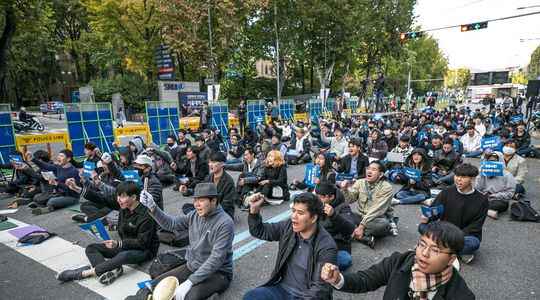“Feminism is a mental illness”, insist, at each demonstration, young activists, who use trucks and deafening sound systems to occupy public space. Pandemic obliges, they are only a few dozen to regularly take to the streets to face processions of militant women. But they represent the malaise of an entire young male generation, accelerated in recent years by the #MeToo wave. In a still very patriarchal society, 79% of South Koreans aged 20-29 and 70% of those aged 30-39 say they oppose feminist movementsaccording to a May 2021 poll.
Bae In-gyu, 31, is one of the leading figures of this macho rebellion. During our interview, he appears in a three-piece suit, neatly combed, while his assistant carries a briefcase of documents supposed to prove the abusive victories of a weaker sex who would no longer be weak. But this youtubeur, self-nicknamed “the Prince”, often disguises himself as a woman, in order to break “their crazy theories by discrediting them”. He can also make himself up like the Joker (in Batman) and claiming in a video that he “will kill every feminist” at a protest. These “are misandres, they hate men, sexual minorities and the elderly. They think that women are superior to others”, he warms up. This violent communication has had some success: nearly 500,000 people subscribe to his videos daily.
In his viewfinder, the seats reserved for pregnant women
For Bae In-gyu, the violence has changed sides, with the appearance of new regulations. “In the 1960s and 1970s, women’s rights were really not respected and there were a lot of bad habits to change. But since the creation of the Ministry of Gender Equality in 2000, there have been a lot of ‘side effects for us.’ In his viewfinder, the seats reserved for pregnant women in the metro, the “false” accusations of the #MeToo movement or even the supposed seizure of power by women in large companies.
Charges refuted by Kim Ju-hee, feminist activist and one of the favorite targets of these groups of men, particularly active online, where they multiply harassment operations. For her, this aggressiveness comes from “an uneasiness in the face of changes in the role of women in society”. However, if South Korean women have easier access to employment or higher education than before, the country is still far from having achieved gender equality. With a median income for women 31% lower than that of men in 2020, South Korea has the worst record in the OECD in this area. And only 3.6% of CEOs of major South Korean companies are women (as of 2019).
Trend picked up by the Conservative Party
Anti-feminist rhetoric, often accompanied by a healthy dose of nationalism and anti-leftism, has been echoed by South Korea’s conservative party. Surfing on this trend, the latter largely won the legislative elections last April, by seducing young people. Lhe Conservative leader then awarded the defeat of the left to its “obsession with a pro-women’s policy”. This profitable strategy was taken up by Yoon Seok-yeol, the right-wing candidate in the March 9 presidential election, who notably promised the elimination of the Ministry of Gender Equality. At the same time, he recalled that “North Korea was the enemy” and promised, if elected, a monthly income of 2 million won (nearly 1500 euros) to each conscript. This is one of the key arguments of anti-feminists: how can we talk about gender discrimination, when only men have to do their military service?
For Kim Ju-hee, 26 and an activist with the women’s group Haeil (the Tsunami), we must put an end to stereotypes. “Dividing roles in society, with men who have to serve in the army and women who have to give birth and raise children, is a vision far removed from gender equality,” she complains. But Korea remains very fractured on this sensitive subject.
